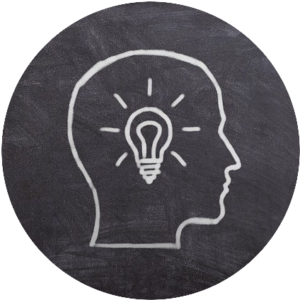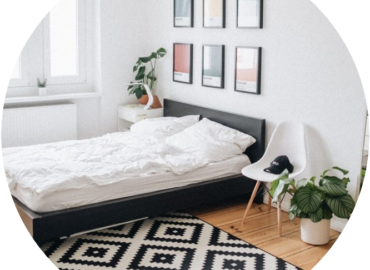The Circadian Rhythm Explained
The Circadian Rhythm is used to describe the behavioral, mental, and physical changes that take place during a 24-hour cycle. The majority of all living things, which includes animals, plants, as well as microbes exhibit some sort of circadian rhythm.
The changes can include heart rate, body temperature, release of hormones, blood pressure, and sleep-wake schedules.
Biological Clocks and The Master Clock – What are They?
There are numerous biological clocks found in different parts of the body. These are the groups of molecules in cells that control various metabolic processes being synchronized by the so-called Master Clock.
The Master Clock can be found deep in the brain, specifically in the SCN or suprachiasmatic nucleus. Located in the hypothalamus, it is a bundle of nerve cells responsible for identifying one’s circadian rhythm. This signals the body’s different systems to bring about the corresponding changes.
Factors That Affect Your Circadian Rhythms
Aside from light, there are other external and internal factors that guide your circadian rhythms. These often include:
- Diet
- Exercise
- Age
- Medications
- Sleep routine
Your day to day schedule, when you choose to exercise or eat your meals, the artificial manipulations of your sleep-wake rhythm, like sleeping during the daytime to make way for a night shift at work, or waking up to the sound of an alarm, can all bring about changes in your circadian rhythms.
Sleep and Circadian Rhythms
There are two types of systems that regulate sleep. These are your circadian rhythms and sleep-wake homeostasis. The later monitors your need for sleep that gathers throughout your waking hours, and identifies the amount of sleep you need to be completely rested.
On the other hand, your circadian rhythms dictate your sleep-wake schedule. This is the timing of when you feel awake and when you feel sleepy. Even though the exact timing will depend on your chorotype, which means whether you are a night owl or an early bird, in general, you feel the sleepiest at 2 to 4 in the morning, with a secondary period between 1 and 3 in the afternoon.
Melatonin and Its Effects on Sleep
Melatonin is the hormone being produced as directed by your body clock. The release of melatonin is triggered when your eyes signal your brain that light is already sleeping, which means that nighttime is approaching.
When the levels of melatonin increase in the evening, this acts as a signal to other body systems that it is now time to sleep. The melatonin levels continue to increase, with the peak at 2 to 4 in the morning when you feel sleepiest. It then gradually tapers off towards the morning.
Common Circadian Rhythm Disorders
There are circadian rhythm disorders that take place when your natural cycle goes out of its usual sync. It can be due to aging when the pineal gland has calcified that leads to reduced production of melatonin. It can also be due to the demands from school, work, or if your social life gets in the way of heeding the signals of your body.
- Jet Lag – It’s probably the most common disorder in terms of Circadian Rhythm. It is usually caused by travelling through a lot of time zones like from the United States to Europe. The symptoms of jet lag include confusion, indigestion, irritability, daytime fatigue, and insomnia.
- DSP or Delayed Sleep Phase Disorder – It causes your schedule for sleep and wake time to be delayed by two hours or more. People who suffer from this condition can’t fall asleep at normal time, but rather heading to bed around two in the morning or later. More often than not, DSP is common to many young adults.
- Shift Work Disorder – Working on rotational shifts or night shifts requires you to adapt sleep-wake schedule that does not match your natural Circadian Rhythm. Symptoms are almost the same with jet lag, yet the only difference is that, you will experience those symptoms even without leaving your time zone. Other than that, daytime sleepers frequently get less sleep and have fragmented sleep compared to when sleeping during night time.
- Irregular Sleep and Wake Rhythm – If your schedule for sleep and wake time shows no predictable schedule in spite of your efforts to have one, you could have irregular sleep and wake rhythm disorder. Those who have this kind of condition might head to bed anytime throughout the day, frequently sleeping in several naps instead of a consolidated period.
- ASP or Advanced Sleep Phase Disorder – Same to DSP, Advanced Sleep Phase Disorder causes one’s sleep-wake schedule to shift a few hours ahead. Those who have ASP frequently get sleepy during early afternoon and often head to bed around 7 to 8 in the evening. Then, their wake time is early in the morning. Older adults often experience ASP.
- Non Sleep Wake Disorder – Usually, this disorder affects the ones who are blind because of missing information from crucial light cues. Normally, the shift starts little by little every day until the periods of waking and sleeping are out of sync with day and night schedule. Those who have this kind of condition experience reduced sleep time, interrupted sleep at night, and daytime sleepiness.
Having a good night rest is dependent also on the mattress that is supporting your back. So, make sure to choose the right mattress for your needs as this can make a difference with your snoring problems.
Ways to Improve Circadian Rhythms
There are several ways on how you can improve Circadian Rhythm. One of the best ways to regulate Circadian Rhythms is through practicing healthy and good sleep practices, in order to keep a structured human sleep cycle.
Through scheduling your daily activities with Circadian Rhythms in mind, you can help resolve your daytime sleepiness issues and improve your overall level and quality of sleep dramatically. If there are still some issues with your sleep and they interfere with your daily responsibilities and affect your overall health condition negatively, the best thing that you should do is to consult a sleep specialist or similarly qualified expert in the field of sleep like a sleep therapist. In this way, you will be provided with the right treatments which are more suited for your needs and tailored to your particular circumstances.
If you found the post interesting please leave a comment and feel free to like and share it. You might find our other pages on sleep and snoring interesting so take some time and browse the site if you are looking to improve your sleep or indeed stop snoring in its tracks.
You can also check out similar sleep and snoring related blog posts on the Snorefocus Blog page.




